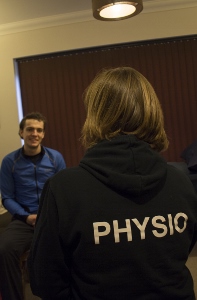Main Menu
Latest Blog Entry
25th March 2025
The father of a 9-year-old boy asked me if I could coach his son 1-1 with his running technique. I said, ‘No.’ Boys that age should be playing outside with their friends, not stuck in an awkward situation with an experienced coach and an expectant father watching on. Unfortunately, the boy attends a private school […]
User login
10 questions you should ask before training
“What should I be asking to get the information I need?”
 This excellent question came from Mark, one of the coaches on our last CPD workshop in Devon. You have a blank sheet of paper, you have a new group of athletes: where do you start?
This excellent question came from Mark, one of the coaches on our last CPD workshop in Devon. You have a blank sheet of paper, you have a new group of athletes: where do you start?
Here are 10 questions you might want to ask (in no particular order).
- How much time do I have with them?
- What is their current level and volume of training?
- What else do they do (outside of the sport)?
- What facilities/ equipment do I have available (available is different from mandatory)?
- What are the Needs to do vs Nice to do for their age/ stage and sport? (from Gambetta).
- How can I integrate training into other aspects of their life?
- How can I organise the session to minimise down time (different from rest time which is necessary)?
- Where do I want them to be in 12 months?
- Where are they now and how can I measure that?
- What unique aspects of the sport are there that might influence my session? (e.g. trampolinists & cricket fast bowlers do repeated movements on one side which affect their back).
This is a start and then you can plan from there. I work from the ground up, rather than try backwards from the “ideal situation”.
It is also important to remember that change takes time: sports coaches, athletes and parents need to be nudged and trust allowed to develop.
Has anyone got any other good questions to ask at the start?
Further reading:
Client Testimonials
 Middlesex LTA
Middlesex LTA
James has been training the top performance players in the county and has proved a great success. The sessions are well organised and the feedback and the programmes given to the players are excellent.
More

